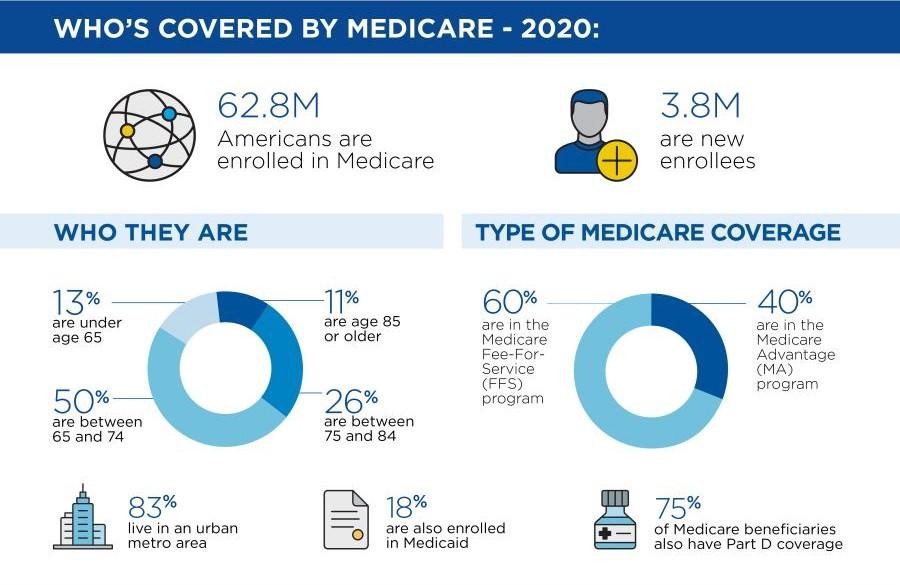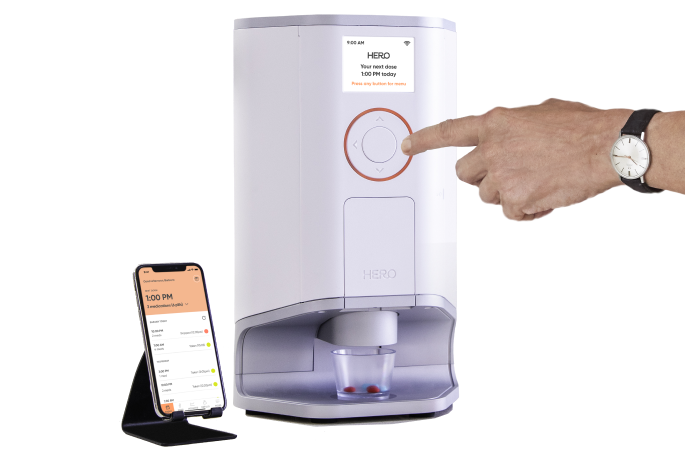Medicare for People Under 65 with Disabilities

"Are you under 65 with a disability and wondering about Medicare eligibility? Uncover the specifics of Medicare coverage, disability benefits, and how a tool like Hero can simplify your healthcare journey. Let's decipher the Medicare maze together!"
Introduction
Did you know that as of 2020, approximately 13% of Medicare beneficiaries are under the age of 65 and are living with disabilities? (Medicare Beneficiaries at a Glance, cms.gov, 2023)
This surprising statistic highlights the critical role that Medicare plays in providing health coverage for individuals with disabilities. This blog post aims to provide you with an understanding of Medicare's role for people under 65 with disabilities and the role of Hero, a digital health company that assists in managing medications, in this context.
What is Medicare? An Overview
Medicare is a health insurance program managed by the federal government. It primarily serves people aged 65 and older, but it also covers certain younger individuals with disabilities and people with other issues such as End-stage renal disease. The Medicare program is divided into several parts, each covering specific services:
- Medicare Part A: Hospital Insurance
- Medicare Part B: Medical Insurance
- Medicare Part C: Medicare Advantage
- Medicare Part D: Prescription Drug Coverage
Most people don't pay a monthly premium for Part A if they or their spouse paid Medicare taxes while working for a certain amount of time. This is sometimes called "premium-free Part A." However, everyone pays a monthly premium for Part B. The standard Part B premium amount in 2023 is $164.90 per month (medicare.gov, 2023).
Medicare Coverage: What You Need to Know
When you enroll in Medicare, you have options in how you get your coverage. There are two main ways:
- Original Medicare: This includes Medicare Part A and Part B. You pay for services as you get them. When you get services, you'll pay a deductible at the start of each year, and you usually pay 20% of the cost of the Medicare-approved service, called coinsurance. If you want drug coverage, you can add a separate prescription drug plan (Part D).
- Medicare Advantage: This is a Medicare-approved plan from a private company that offers an alternative to Original Medicare for your health and prescription drug coverage. These “bundled” plans include Part A, Part B, and usually Part D. Plans may offer some extra benefits that Original Medicare doesn’t cover — like vision, hearing, and dental services.
Understanding Medicare and its various components can help you make informed decisions about your healthcare coverage as you age or if you have certain disabilities (medicare.gov, 2023).
What Disabilities Qualify for Medicare Under 65?
Medicare is typically associated with individuals aged 65 and over. However, certain disabilities can qualify a person for Medicare benefits even if they are under 65. These include:
- Disability Benefits Recipients: If you have been receiving disability benefits from Social Security, or a entity such as the Railroad Retirement Board, for 24 months, you automatically qualify for Medicare (ssa.gov, 2023). It's important to note that the specific conditions that qualify an individual for Social Security Disability Insurance (and thus Medicare after a 24-month waiting period) are numerous and vary widely. They can include conditions such as severe heart disease, cancer, mental disorders like depression and anxiety, neurological disorders, immune system disorders like HIV/AIDS and lupus, and many others. You can find more information here: Disability Benefits Help - Disabling Conditions.
- End-Stage Renal Disease (ESRD): This is a medical condition where the kidneys have stopped working permanently or are very close to failing. People with ESRD require regular dialysis or a kidney transplant to survive (medicare.gov, 2023).
- Amyotrophic Lateral Sclerosis (ALS): Also known as Lou Gehrig's disease, ALS is a specific disorder that causes the death of neurons controlling voluntary muscles (cdc.gov, 2023).
It's important to understand that the Social Security Administration doesn't consider the specific type of disability as much as they do the impact of that disability on your ability to work. If you have a medical condition that significantly limits your ability to do basic work such as lifting, standing, walking, sitting, or remembering – for at least 12 months – you may qualify for benefits.
Disability Benefits: A Closer Look at Medicare Benefits
Medicare offers comprehensive coverage for individuals with disabilities, including:
- Hospital Insurance (Part A): This covers inpatient hospital stays, care in a skilled nursing facility, hospice care, and some home health care. Most people don't pay a premium for Part A because they or a spouse paid Medicare taxes while working.
- Medical Insurance (Part B): This covers certain doctors' services, outpatient care, medical supplies, and preventive services. Most people pay a standard premium for Part B.
- Medicare Advantage Plans (Part C): An alternative to Original Medicare, these plans are offered by private companies approved by Medicare. They provide all Part A and Part B benefits and often include prescription drug coverage.
- Prescription Drug Coverage (Part D): Helps cover the cost of prescription drugs.
While Medicare provides substantial health coverage, it does not cover everything. Long-term care, most dental care, eye exams related to prescribing glasses, dentures, cosmetic surgery, acupuncture, and hearing aids and exams for fitting them are not typically covered (medicare.gov, 2023).
Case study: Medicare and End-Stage Renal Disease
For example we can look at End-Stage Renal Disease, a severe form of chronic kidney disease, and see how medicare would facilitate coverage for a disease which is a significant health concern in the United States. According to the Centers for Disease Control and Prevention (CDC), over 750,000 Americans are affected by ESRD, with the number projected to rise (cdc.gov).
Medicare Coverage for End-Stage Renal Disease
Medicare offers comprehensive coverage for individuals diagnosed with ESRD, irrespective of their age. This coverage what look like this:
- Dialysis treatments: In-center or at-home dialysis sessions are covered under Medicare Part B.
- Kidney transplant: Both the surgery and the follow-up care are covered under Medicare Part A and Part B.
- Prescription drugs: Medications related to ESRD treatment are covered under Medicare Part D.
- Mental health services: Mental health care, including counseling and depression screening, is covered as ESRD can often lead to mental health issues (medicare.gov, 2023).
Paying Medicare taxes is crucial for ESRD patients as it determines their eligibility for Medicare coverage. Individuals who have paid the taxes for a sufficient amount of time (usually at least 40 quarters) are eligible for premium-free Medicare Part A, which covers inpatient hospital stays, care in a skilled nursing facility, hospice care, and some home health care. This can significantly reduce the financial burden of ESRD treatment. Moreover, the spouse, child, or parent of a person who has paid sufficient Medicare taxes can also qualify for Medicare due to ESRD (ssa.gov, 2023).
Medicare Eligibility
In the United States, there are several federal programs that provide eligibility for Medicare, particularly for individuals under 65 with disabilities:
- Social Security Disability Insurance (SSDI): This program provides Medicare to people who have a disability and have earned enough Social Security work credits. The disability must be severe enough to prevent any substantial gainful activity and is expected to last at least 12 months or result in death. After a 24-month waiting period from the date of eligibility, individuals can receive Medicare benefits (ssa.gov).
- Supplemental Security Income (SSI): This program provides Medicare to people who have a disability, are blind, or are aged 65 or older and have limited income and resources. In most states, SSI beneficiaries are automatically eligible for Medicaid, and nearly all Medicaid disability pathways use the same definition of disability that SSI uses (ssa.gov).
- Railroad Retirement Board (RRB) Benefits: This program provides Medicare to people who have a disability and are unable to work in their regular occupation. The disability must be expected to last at least 12 months or result in death. After a waiting period, individuals can receive Medicare benefits (rrb.gov).
- Medicaid: Some states have Medicaid programs that provide health coverage including Medicare to certain people with disabilities who have income too high for regular Medicaid but could afford the cost of Medicaid coverage with some help. These are called "Medically Needy" programs and use a "spend down" process that allows deductions for medical expenses to determine eligibility (medicaid.gov).
Please note that the specifics of some of these programs can vary by state, and it's important to check with your local state agency for the most accurate information.
The Social Security Administration
The Social Security Administration (SSA) plays a crucial role in determining Medicare eligibility. Generally, individuals are eligible for Medicare if they are of age 65 or older, or if they have certain disabilities or ESRD. However, the SSA is responsible for determining eligibility based on these criteria and enrolling eligible individuals into the program.
The SSA also manages the collection of Medicare premiums through the Social Security retirement, disability, and survivor benefits systems. This is a critical function as it ensures the financial sustainability of the Medicare program. Furthermore, the SSA provides information and resources to help individuals understand their Medicare options and make informed decisions about their healthcare coverage (ssa.gov, 2023).
Connecting Railroad Retirement Board Benefits to Medicare Eligibility: An Example
The Railroad Retirement Board (RRB) is integral in determining Medicare eligibility for railroad industry workers. The RRB enrolls qualified beneficiaries into Medicare based on age, disability, and ESRD criteria. Besides, it collects Medicare premiums from these beneficiaries through the separate Railroad Retirement system and provides necessary information for making informed decisions about healthcare coverage.
These two entities, the SSA and the RRB, work in tandem to ensure that eligible individuals, whether from the general population or the railroad industry, are enrolled in the Medicare program and have the information they need to navigate their healthcare options.
Complex med schedule? We solved it.
Hero’s smart dispenser reminds you to take your meds and dispenses the right dose, at the right time.

Medicare Enrollment
Medicare, the U.S. government's health insurance program for seniors and certain disabled individuals, has seen a steady increase in enrollment over the years. As of 2023, the Centers for Medicare & Medicaid Services reports that more than 28 million Medicare beneficiaries are enrolled in a Medicare Advantage plan, nearly half of the total Medicare population (cms.gov, 2023).
Medicare enrollment is generally divided into three periods:
- Initial Enrollment Period (IEP): This is the seven-month period during which individuals first become eligible for Medicare, typically at age 65. It includes the three months before the month of one's 65th birthday, the month of the birthday, and the three months following the birthday month.
- General Enrollment Period (GEP): This runs from January 1 through March 31 each year. Individuals who missed their IEP can enroll during the GEP, but they may have to pay higher premiums as a penalty for late enrollment.
- Special Enrollment Periods (SEPs): SEPs allow individuals to enroll in Medicare outside of the IEP and GEP under certain circumstances, such as if they lose their current coverage, move out of their plan's service area, or qualify for Extra Help with Medicare prescription drug costs.
Enrollment for people under 65 with disabilities
For individuals under the age of 65 with disabilities, the process of enrolling in Medicare is a bit different. After you've been receiving disability benefits from Social Security or certain disability benefits from the RRB for 24 months, you'll automatically be enrolled in Medicare Part A and Part B. However, because you must pay a premium for Part B coverage, you have the option to turn it down.
You'll receive a Medicare card in the mail 3 months before your 25th month of disability. If you have ALS (Lou Gehrig's disease), you automatically get Part A and Part B the month your disability benefits begin.
If you're under 65 and have End-Stage Renal Disease, you can apply for Medicare. To do so, you need to complete an application for enrollment in Medicare (Form CMS-40B). You can also apply online at the Social Security website. If you have ESRD and haven't applied for Medicare benefits, you should contact Social Security right away. If you have questions, you can call 1-800-MEDICARE (1-800-633-4227). TTY users can call 1-877-486-2048 (medicare.gov, 2023).
Keep in mind that qualifying for SSDI and Medicare depends on the severity of the condition, not the condition itself. If you think you might be eligible, you should contact the SSA or a legal advisor to better understand your options.
Medicare Advantage Plans: A Comprehensive Health Insurance Coverage
Medicare Advantage Plans, also known as Medicare Part C, are an alternative to Original Medicare (Part A and Part B). These plans are offered by private insurance companies approved by Medicare and often include additional benefits such as prescription drug coverage, dental, vision, and wellness programs. As of 2023, there are over 24 million people enrolled in Medicare Advantage Plans, accounting for 40% of all Medicare beneficiaries (medicare.gov, 2023).
How to Choose the Right Medicare Advantage Plan
Choosing the right Medicare Advantage Plan depends on your individual health needs, budget, and lifestyle. Here are some key factors to consider:
- Coverage: Ensure the plan covers the services you need. This includes hospital care, doctor visits, and prescription drugs. Some plans also offer additional benefits like dental and vision care.
- Cost: Look at the plan's premiums, deductibles, and out-of-pocket costs. Remember, the lowest premium may not always be the cheapest plan overall.
- Doctor and hospital choice: Check if your doctors and preferred hospitals are in the plan's network. Out-of-network care can be more expensive.
- Quality of care: Medicare rates plans based on the quality of care they provide. Look for plans with high ratings.
- Travel: If you travel frequently, ensure the plan covers health care services in your travel destinations.
Remember, it's crucial to review your plan each year during the open enrollment period to make sure it still meets your needs (medicare.gov, 2023).
Helpful resources
In seeking to better understand the intricacies of Medicare for individuals with disabilities, there are numerous reliable resources that provide comprehensive information and assistance.
- Medicare.gov: This is the official U.S. government site for Medicare. It is an excellent starting point for learning about different parts of Medicare, understanding eligibility, comparing plans, and checking coverage.
- Social Security Administration (SSA): The SSA website provides detailed information about disability benefits, including how to apply for Medicare due to a disability.
- The Centers for Medicare and Medicaid Services (CMS): CMS provides comprehensive resources related to Medicare, Medicaid, and the Children’s Health Insurance Program (CHIP). Their publications, toolkits, and data sets are invaluable.
- State Health Insurance Assistance Programs (SHIPs): These provide free, in-depth, one-on-one insurance counseling and assistance to Medicare beneficiaries, their families, and caregivers.
- Disability Rights Education & Defense Fund (DREDF): This organization offers a wealth of information on healthcare and disability laws, ensuring disabled individuals are aware of their rights and protections.
It's always crucial to cross-reference information and speak with professionals such as social workers, health advocates, or legal advisors for personal guidance and clarity.
Hero: Your Ally in Navigating Medicare
As part of the evolution in healthcare services, Medicare has made significant strides to incorporate and cover a variety of medical technologies and aids that considerably improve the quality of life for beneficiaries, particularly those with disabilities. These range from basic durable medical equipment (DME) such as wheelchairs and walkers, to more advanced systems like continuous glucose monitors for managing diabetes, and even telehealth services which can provide access to healthcare right from home.
One of the standout options in this realm of transformative health solutions is Hero. Hero has developed an innovative remote medication management platform that may be highly beneficial for Medicare beneficiaries, especially those living with disabilities. Let's delve deeper into how Hero is revolutionizing healthcare management for Medicare beneficiaries.
How Hero Simplifies Medication Management for Medicare Beneficiaries
Hero simplifies medication management in several ways. First, Hero offers a comprehensive medication management system that includes a smart dispenser capable of storing up to a 90-day supply of 10 different medications. The dispenser sorts and dispenses pills according to the user's programmed schedule and sends text and audio reminders when it's time to take a dose. This system is particularly beneficial for Medicare beneficiaries who have multiple medications to manage.
Moreover, Hero's system provides real-time adherence data to family members and caregivers, keeping them informed and involved in the patient's medication management. This feature is especially useful for caregivers of Medicare beneficiaries who may not live with the patient but still need to monitor their medication adherence.
Additionally, Medicare now covers Remote Therapeutic Monitoring (RTM) services which can aid patients with a musculoskeletal and/or respiratory condition. Healthcare professionals offering RTM services can provide devices like Hero to Medicare beneficiaries in an effort to help them manage their medications and control chronic disease. Through RTM, Hero is more accessible to Medicare beneficiaries, who often can use Hero for little or no cost (copays and coinsurance may still apply).
Hero's Role in Enhancing Health Care Services for Disabled Medicare Beneficiaries
For disabled Medicare beneficiaries under 65, Hero can be a game-changer. The platform's remote monitoring capabilities allow caregivers and healthcare providers to keep track of which medications are taken and when, an important service for those with chronic conditions requiring strict medication adherence. More than 100,000 Americans die each year from medication non-adherence, surpassing deaths from influenza, pneumonia or car accidents (Permanente, 2018). Put another way, medication non-adherence would rank as the 7th leading cause of death in the United States.
Moreover, the simplicity and ease of use of Hero's platform can empower disabled beneficiaries to take a more active role in managing their medications. The automatic pill dispenser and the accompanying app, which tracks medication usage and sends reminders, can significantly reduce the burden of medication management.
Furthermore, the Centers for Medicare & Medicaid Services now provide coverage and payment for RTM under Medicare Part B, making Hero's services more accessible to disabled beneficiaries. This coverage may lead to better health outcomes, as patients using Hero have a 90%+ medication adherence rate.
Conclusion: Embracing the Complexity of Medicare
The landscape of healthcare and Medicare is rapidly evolving, particularly for younger beneficiaries and people with disabilities. The advent of new technologies and services, such as those provided by Hero, are playing a crucial role in this transformation.
Medicare's influence on the lives of individuals with disabilities is substantial, offering them a gateway to vital health care services.
Despite its benefits, understanding the intricacies of Medicare can be a daunting task. This is where resources like Medicare.gov prove to be invaluable, offering detailed information and assistance on various facets of Medicare, such as eligibility, enrollment, coverage options, and more.
How Hero is Revolutionizing Health Care for Younger Medicare Beneficiaries
Hero is at the forefront of revolutionizing health care for Medicare beneficiaries under 65. Their innovative approach combines smart technology with personalized care, making medication management easier and more efficient.
In essence, Hero is not just providing a product; it's offering a comprehensive solution that addresses the unique needs of younger Medicare beneficiaries. The future of Medicare faces challenges, yet also holds potential, particularly with the integration of technology and personalized care. As we move forward, it's essential to continue exploring and implementing innovative solutions like Hero, to ensure that all beneficiaries, regardless of age or disability status, have access to the best possible care.
Disclaimer: The contents of the above article are for informational and educational purposes only. The article is not intended to be a substitute for professional medical advice, diagnosis, or treatment. Always seek the advice of your physician or other qualified clinician with any questions you may have regarding a medical condition or its treatment and do not disregard professional medical advice or delay seeking it because of information published by us. Hero is indicated for medication dispensing for general use and not for patients with any specific disease or condition. Any reference to specific conditions are for informational purposes only and are not indications for use of the device.
Sources:
The contents of the above article are for informational and educational purposes only. The article is not intended to be a substitute for professional medical advice, diagnosis, or treatment. Always seek the advice of your physician or other qualified clinician with any questions you may have regarding a medical condition or its treatment and do not disregard professional medical advice or delay seeking it because of information published by us. Hero is indicated for medication dispensing for general use and not for patients with any specific disease or condition. Any reference to specific conditions are for informational purposes only and are not indications for use of the device.



